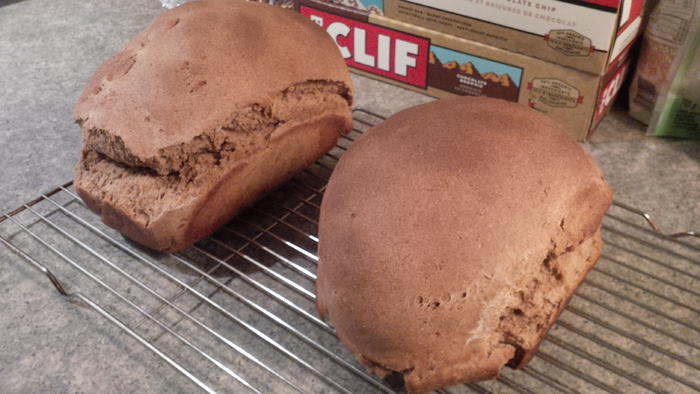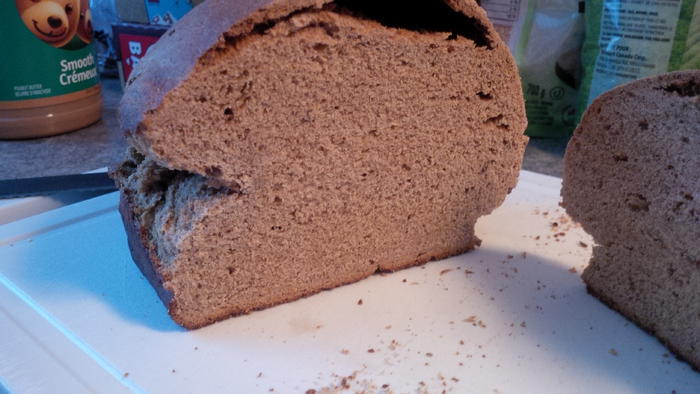Results 281 to 290 of 1198
Thread: Who bakes bread?
-
12-26-2016, 04:26 AM #281

Our yearly two loaves of rye bread. They always taste so good, but look so terrible. I'm referring to the sides of my loaves.
Can you diagnose what the problem is? I am still relatively new at this bread-baking art.


-
12-26-2016, 04:30 AM #282

How many times do you let the dough rise?
Our house is as Neil left it- an Aladdins cave of 'stuff'.
Kim X
-
12-26-2016, 04:44 AM #283

Twice. Between 20 and 30 minutes each time
-
12-26-2016, 04:57 AM #284

I have two thoughts;
1st. Try Three Rises,
2nd. Try using larger baking pans OR Make loaves like making French Bread.
It just looks like there is way too much expansion and that expansion is happening very fast and is just exploding out of your pans.
I sincerely hope OCD chimes in as I'm just an old redneck countryboy and he has some serious baking training. Our house is as Neil left it- an Aladdins cave of 'stuff'.
Our house is as Neil left it- an Aladdins cave of 'stuff'.
Kim X
-
The Following User Says Thank You to cudarunner For This Useful Post:
Lolita1x2 (12-26-2016)
-
12-26-2016, 05:19 AM #285Senior Member



- Join Date
- Jul 2012
- Location
- Chicagoland - SW suburbs
- Posts
- 3,809
- Blog Entries
- 1
Thanked: 734
Lolita, yes your dough has all the traits of a very young dough. An initial rise should take two hours, the second st least one hour. I know folks want to get over the finish line fast but time is a crucial element in making bread. I suspect your recipe either has too much yeast or suggests warming your water to speed up fermentation or both. Loaf size seems to be a problem as well since they appear to have burst beyond the pan size. Slashing the tops of the loaves before they go in the ove will help them from bursting as the cuts give them a place to expand. The expansion is going to happen so you want to tell it where and how. Slashing the loaves will do that for you. Finally forming a loaf is not too difficult but it pays to do it with care. Getting the loaves in uniform shape and size before their final rise is important in dictating the final appearance of the loaf. Pick up a copy of The Bread Bakers Pprentice. Get one second hand if need be. The book will give you valuable information on every step and, more important, why each step is needed. If you can learn to hone a razor you can make a loaf of bread. You can do this.
-
The Following User Says Thank You to OCDshaver For This Useful Post:
Lolita1x2 (12-26-2016)
-
12-26-2016, 08:35 AM #286

Yep, they pretty much nailed it already. "Too young of dough." is what jumped out at me right away. Then, OCD ran down the list from there
 .
.
Though we have only ran a few test doughs of rye in the 4~ish years I've been at the bread factory, there are a couple of varieties that are "shoehorned" into a pan not intended for such a heavy loaf. It is a 32 oz. loaf, in a 20 oz. pan. We do this with an intentionally wet & over mixed dough. Makes a dense loaf, with a fine texture. But we have to be careful with the proofing. Usually proofs longer, and warmer. The bake is lower & longer, as well.
I don't know if my additional information is specific enough for you, but I hope it was helpful!Decades away from full-beard growing abilities.
-
The Following User Says Thank You to Crawler For This Useful Post:
Lolita1x2 (12-26-2016)
-
12-26-2016, 01:33 PM #287

Gentlemen.
Much appreciated. I must admit that I am working off a recipe with direction like "Let rise as needed" or "knead until done," which put a smile on my face because they remind me of my Italian grandmother.
Now, with all of your suggestions, I will likely have to try this recipe again soon. And post results here.
Will definitely pick up the bread book recommended. It is Boxing week after all.
Thank you gents for your feedback.
-
12-26-2016, 02:24 PM #288Senior Member

- Join Date
- Nov 2014
- Location
- Sacramento
- Posts
- 309
Thanked: 135
I would maybe add if you're going off of volume measurements to switch to weighing everything out. Made a huge difference with my baking. Also, be sure to not let the surface of the dough dry out during final proofing; that can cause the separation of the crust and crumb.
But really, you nailed the main thing; it tastes great!
Bake on,
Paul
-
The Following User Says Thank You to Paulbuck For This Useful Post:
Lolita1x2 (12-26-2016)
-
12-26-2016, 07:12 PM #289Senior Member



- Join Date
- Jul 2012
- Location
- Chicagoland - SW suburbs
- Posts
- 3,809
- Blog Entries
- 1
Thanked: 734
Could not agree more about the kitchen scale. I actually suggest getting two. One for bulky items and another for small measurements (yeast, sugar, salt). You'll find it difficult to get an accurate measure of a single gram or two with most standard scales. A 100 g calibrating weight isn't a bad thing to have on hand either. Once you have your recipe in weights, you can readily adjust for larger or smaller loaves to accommodate whatever bakeware you currently have.
-
The Following User Says Thank You to OCDshaver For This Useful Post:
Lolita1x2 (12-26-2016)
-
12-26-2016, 09:48 PM #290Senior Member

- Join Date
- Nov 2014
- Location
- Sacramento
- Posts
- 309
Thanked: 135


 3013Likes
3013Likes LinkBack URL
LinkBack URL About LinkBacks
About LinkBacks






 Reply With Quote
Reply With Quote




